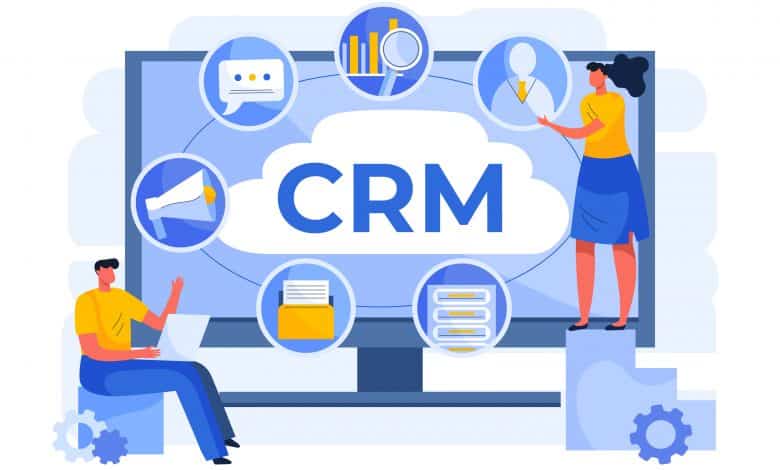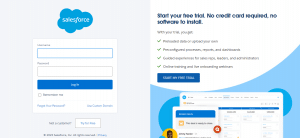Salesforce Review: Unleashing the Power of CRM for Businesses

Salesforce is a game-changing CRM platform that has transformed customer relationship management for businesses. Its powerful tools and features make it a leader in the industry, enabling organizations to streamline sales, marketing, and customer service processes.
In this article, we will explore Salesforce CRM, including its capabilities, benefits, and integration options. Whether you're new to CRM or considering a switch to Salesforce, this review reveals the immense power and potential of Salesforce CRM.
What Is Salesforce?
Salesforce CRM, commonly known as Salesforce, is a cloud-based CRM platform that provides organizations with a centralized system to manage their customer relationships, sales processes, and customer data.
CRM involves managing customer interactions and data to boost satisfaction, enhance sales and marketing, and drive business growth.
Salesforce offers a range of tools and functionalities designed to enhance sales productivity, optimize marketing campaigns, and improve customer service experiences.
How Salesforce works:
Salesforce offers a diverse set of core functionalities that cater to various aspects of customer relationship management. These include:
- Lead and Opportunity Management. Salesforce allows businesses to capture and organize leads, track opportunities, and manage sales pipelines effectively. It provides a comprehensive view of customer interactions, enabling sales teams to prioritize leads and close deals more efficiently.
- Sales Forecasting and Analytics. With Salesforce, organizations can generate accurate sales forecasts and gain valuable insights into their sales performance. Advanced analytics and reporting capabilities enable businesses to identify trends, track key metrics, and make data-driven decisions.
- Marketing Automation. Salesforce integrates marketing automation tools to streamline marketing campaigns, automate lead nurturing processes, and personalize customer communications. It helps businesses generate more leads, nurture them through the sales funnel, and measure campaign effectiveness.
- Customer Service and Support. Salesforce offers a robust customer service module that enables organizations to provide exceptional support experiences. Features like case management, knowledge bases, and omnichannel support allow businesses to resolve customer issues promptly and deliver personalized service.
What Are Salesforce’s Features?
Salesforce offers a wide range of features across its various clouds to cater to the specific needs of businesses. Let's take a closer look at the key features within each Salesforce cloud:
1. Sales Cloud
Sales Cloud is a powerful solution within Salesforce that empowers sales teams with various features to streamline their processes and enhance productivity. Here are some key features of Sales Cloud:
- Lead and Opportunity Management
- Contact and Account Management
- Sales Forecasting and Analytics
- Collaboration Tools for Sales Teams
2. Service Cloud
Service Cloud is a comprehensive customer service solution within Salesforce that helps businesses deliver exceptional support experiences. Let's explore some of its key features:
- Case Management and Ticketing System
- Knowledge Base and Self-Service Portals
- Omni-Channel Customer Support
- Service Level Agreement (SLA) Management
3. Marketing Cloud
Marketing Cloud is a comprehensive marketing automation platform offered by Salesforce. It provides a suite of tools and features to create personalized marketing campaigns and engage customers effectively. Here are some key features of Marketing Cloud:
- Email Marketing Campaigns and Automation
- Social Media Integration and Monitoring
- Customer Journey Mapping and Personalization
- Analytics and Reporting for Marketing Campaign
4. Commerce Cloud
Commerce Cloud is Salesforce's e-commerce platform that enables businesses to create personalized and seamless shopping experiences for their customers. Here are some of the key features of Commerce Cloud:
- E-commerce Platform and Storefront Creation
- Order and Inventory Management
- Personalized Shopping Experiences
- AI-Powered Product Recommendations
5. Community Cloud
Community Cloud enables businesses to build branded online communities for customers, partners, and employees. Here are some key features of Community Cloud:
- Customer and Partner Community Creation
- Discussion Forums and Knowledge Sharing
- Collaboration and Ideation Features
- Content Management and Moderation Tools
6. AppExchange
AppExchange is Salesforce's marketplace for third-party applications and integrations that extend the functionality of Salesforce products. AppExchange provides numerous benefits to businesses, including access to specialized functionalities, time and cost savings through pre-built solutions, and the ability to customize and enhance Salesforce according to specific business needs. It offers a wide range of popular apps and integrations for various purposes.
Salesforce Pricing Tiers
Salesforce offers different pricing tiers to accommodate businesses of all sizes and requirements. The pricing structure is designed to provide flexibility and scalability, allowing businesses to choose the most suitable option based on their needs.
Salesforce Essentials is the entry-level pricing tier, ideal for small businesses. It offers core CRM features, including contact and account management, email integration, and basic sales automation capabilities, at an affordable price.
| Pricing Tier | Features | Price (User/Month) |
|---|---|---|
| Starter | Customizable dashboards, workflow automation, collaboration tools | $25 |
| Professional | Advanced CRM features | $75 |
| Enterprise | Advanced analytics, customizable applications, enhanced security features | $150 |
| Unlimited | Unlimited customization options, round-the-clock support, access to additional products and services | $300 |
Who Should Use Salesforce?
Salesforce CRM is designed to cater to a wide range of businesses and industries, making it suitable for various target audiences. It is particularly beneficial for sales teams, customer service departments, and marketing professionals who aim to streamline their processes, improve customer relationships, and enhance overall business efficiency.
Additionally, Salesforce offers solutions for different sectors, including finance, healthcare, retail, manufacturing, and more.
- Small businesses: Salesforce provides small businesses with an affordable and scalable CRM solution that helps them manage customer relationships, track sales opportunities, and automate repetitive tasks. It enables small businesses to compete with larger enterprises by providing robust features at a lower cost.
- Mid-sized companies: Mid-sized companies benefit from Salesforce's advanced functionalities, such as sales forecasting, pipeline management, and marketing automation. It empowers them to optimize their sales processes, improve collaboration between teams, and gain insights into customer behavior, leading to increased revenue and growth.
- Enterprises: Salesforce is highly customizable and offers enterprise-level solutions to address complex business needs. It allows large organizations to manage extensive sales pipelines, support multiple departments, and integrate with other enterprise systems. Salesforce's scalability and flexibility make it an ideal choice for enterprises aiming to drive innovation and improve customer experiences.
Salesforce is widely adopted across various industries and sectors, including
- Sales and Marketing. Salesforce CRM provides sales teams with tools to manage leads, track opportunities, and close deals. It also offers marketing automation capabilities, allowing businesses to create targeted campaigns and measure their effectiveness.
- Customer Service. Salesforce Service Cloud enables customer service teams to efficiently handle customer inquiries, provide personalized support, and resolve issues promptly. Its omni-channel capabilities ensure consistent and seamless customer experiences across different channels.
- Financial Services. Salesforce Financial Services Cloud offers industry-specific solutions tailored to the needs of financial institutions. It provides tools for managing client relationships, financial planning, compliance, and wealth management.
- Healthcare. Salesforce Health Cloud assists healthcare providers in managing patient relationships, improving care coordination, and delivering personalized experiences. It helps streamline workflows, track patient information, and facilitate communication between healthcare professionals.
- Retail. Salesforce Commerce Cloud enables retailers to deliver personalized shopping experiences across multiple channels. It offers features like inventory management, order fulfillment, and customer loyalty programs, helping businesses drive sales and enhance customer satisfaction.
Numerous organizations have successfully implemented Salesforce and witnessed significant improvements in their business operations. Coca-Cola implemented Salesforce to transform its sales and distribution processes. By leveraging Salesforce's CRM capabilities, the company improved sales efficiency, increased customer satisfaction, and gained better insights into its operations.
T-Mobile, a leading telecommunications provider, utilized Salesforce to enhance its customer service experience. With Salesforce Service Cloud, T-Mobile achieved a unified view of customer interactions, reduced response times, and improved customer satisfaction metrics.
Pros and Cons of Salesforce
Salesforce, a leading customer relationship management (CRM) platform, offers numerous benefits such as streamlined sales processes, enhanced collaboration, and extensive customization options. However, it also has its drawbacks, including high costs, a steep learning curve, and potential data security concerns.
Explore the pros and cons of Salesforce to make an informed decision for your business.
Pros
- Comprehensive feature set
- Scalable and customizable
- Robust integration options
- Mobile-friendly
- Strong community support
- Regular platform updates
- Extensive marketplace for app extensions and integrations
Cons
- High learning curve
- Expensive pricing
- Complex setup and configuration
- Occasional system downtime
- Limited offline access
- Customization limitations
- Potential dependence on third-party consultants for complex implementations
Conclusion
Salesforce offers a range of features and pricing options that cater to various business needs. Its CRM capabilities enable efficient customer management and improved sales processes. Small businesses, large enterprises, and organizations from diverse industries can benefit from Salesforce's flexible solutions.
Considering its robust features, scalability, and reputation, Salesforce is a recommended CRM choice for businesses seeking effective customer relationship management.
Explore the available options and find the Salesforce package that aligns with your specific requirements and goals.






